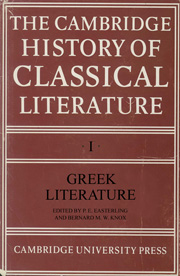Book contents
- Frontmatter
- 1 Books and readers in the Greek world
- 2 Homer
- 3 Hesiod
- 4 The epic tradition after Homer and Hesiod
- 5 Elegy and iambus
- 6 Archaic choral lyric
- 7 Monody
- 8 Choral lyric in the fifth century
- 9 Early Greek philosophy
- 10 Tragedy
- 11 The satyr play
- 12 Comedy
- 13 Historiography
- 14 Sophists and physicians of the Greek enlightenment
- 15 Plato and the Socratic work of Xenophon
- 16 Oratory
- 17 Aristotle
- 18 Hellenistic poetry
- 19 Post-Aristotelian philosophy
- 20 The literature of the Empire
- 21 Epilogue
- Appendix of authors and works
- Metrical appendix
- Works Cited in the Text
- References
16 - Oratory
Published online by Cambridge University Press: 28 March 2008
- Frontmatter
- 1 Books and readers in the Greek world
- 2 Homer
- 3 Hesiod
- 4 The epic tradition after Homer and Hesiod
- 5 Elegy and iambus
- 6 Archaic choral lyric
- 7 Monody
- 8 Choral lyric in the fifth century
- 9 Early Greek philosophy
- 10 Tragedy
- 11 The satyr play
- 12 Comedy
- 13 Historiography
- 14 Sophists and physicians of the Greek enlightenment
- 15 Plato and the Socratic work of Xenophon
- 16 Oratory
- 17 Aristotle
- 18 Hellenistic poetry
- 19 Post-Aristotelian philosophy
- 20 The literature of the Empire
- 21 Epilogue
- Appendix of authors and works
- Metrical appendix
- Works Cited in the Text
- References
Summary
THE BEGINNINGS OF LITERARY ORATORY
Discourse appears in Greek literature from the very beginning as a characteristic feature of Greek life. The debates of Iliad 1 and 2, the embassy of Iliad 9, and the pathetic appeal of Priam in Iliad 24 were often cited by later rhetoricians, while the comparison in the Iliad (3.212–24) of the oratory of Odysseus and Menelaus shows a critical awareness of style and delivery at the dawn of European literature. The poets continued to include speeches in their works. Important stages in rhetorical history are the Homeric Hymn to Hermes, which has apparently the earliest instance (line 265) of argument from probability, the major logical tool of Greek oratory, and the trial scene in Aeschylus' Eumenides, which reflects judicial procedure in Athens just before the emergence of literary oratory.
In the second half of the fifth century oratory became a literary genre in its own right. We have orations by Gorgias, Antiphon and Andocides and testimony from Thucydides, Aristophanes, Plato and other writers. In order, however, to understand literary oratory it is necessary first to review the developing role of public speaking in fifth-century political and intellectual life.
Both Greek rhetorical theory and self-conscious techniques of oratory seem to be a product of democracy as it developed in Athens after the Persian Wars, especially after the reforms of Ephialtes (462 B.C.), and in Syracuse when democracy replaced tyranny (467 B.C.). According to tradition, rhetoric was ‘invented’ by a Sicilian named Corax who taught Syracusans involved in litigation before democratic courts how to argue from the probabilities of their situation.
- Type
- Chapter
- Information
- The Cambridge History of Classical Literature , pp. 498 - 526Publisher: Cambridge University PressPrint publication year: 1985



